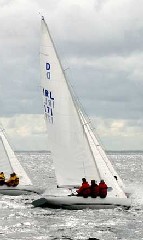Displaying items by tag: Irish Dragon Association
Irish Dragon Association
 Dublin Bay Dragon Fleet – 2009 Officers
Dublin Bay Dragon Fleet – 2009 Officers
Admiral – Martin Byrne
Hon. Secretary – Tim Pearson
Record Keeper – Daniel Murphy
Hon. Treasurer – Peter Bowring
Irish Dragon Association c/o Tim Pearson, Secretary, 44 Orpen Green, Stillorgan Grove, Blackrock, Co. Dublin. Tel: 01 283 2423, email: [email protected]
There is a space for Irish boating clubs and racing classes to use as their own bulletin board and forum for announcements and discussion. Click here for all the latest Dragon News.
Afloat's Graham Smith wrote, in the March 2009 issue: "Sorenson (from Kinsale) won the Easterns but was even more impressive in winning the Italian Nationals in San Remo, while O’Donoghue won the Edinburgh Cup and was fourth and ninth at two major French events. Not surprisingly, he won the Class’s Travellers’ Trophy for his exploits abroad.
Back home, the Royal St George’s Martin Byrne had a memorable season, winning the Southerns in Kinsale and then becoming Irish Champion from a 16-strong fleet in Dun Laoghaire. Based on combined results, however, the defending champion Neil Hegarty tops the class rankings for the year.
The Dragon’s national fleet numbers remain static, but at a very healthy 42, and turnouts at open events is confidently expected to return to previous highs in the year ahead. National Champion 2009: Martin Byrne, Royal St George YC"
About the The Dragon
The Dragon was designed by Johan Anker in 1929. The original design had two berths and was ideally suited for cruising in his home waters of Norway. The boat quickly attracted owners and within ten years it had spread all over Europe.
In 1937 the Gold Cup was presented to the class by the Clyde Yacht Club Association. This quickly became one of the principal championships in the class and a prestigious trophy in the world of competitive yachting.
Origin of the Name
Gunter Ahlers writes: In the beginning boats were built by the designer's yard, Anker and Jensen, as a 'cheap' scerry cruiser for young people.
When the design was submitted to the then IYRU (now ISAF) he or someone else translated his name 'Anker' into Norwegian language 'Draggen' and the English, being reluctant to speak other languages, made out of 'Draggen', 'Dragon', probably thinking that this Norwegian did not even know how to spell Dragon.
This is how this Class came to its name, so I was told years ago. If it is not quite true, it comes close to being true and is a good story anyhow... see also Early Dragon History, an informal posting on the IDA Forum
After the excitement of the World Championships on Dublin Bay the previous year, 2008 could have been something of an anti-climax for the Dragons, yet the elegant one-design still produced fleets of 18 or so for its various championship events and Irish performances overseas were highly commendable, particularly by Don O’Donoghue and Olaf Sorenson.
Aims of the IDA
To further the interests of the International Dragon Class in all countries where Dragons are sailed and to introduce the Class to new countries.
To be responsible for the administration of the class rules and coordinating proposals for rule amendments for consideration by the International Sailing Federation (ISAF).
To ensure that the class retains its "International" status by complying with the criteria adopted by the ISAF.
To co-ordinate and select venues for the following International Championships: 1 World Championships; 2 European Championships; and 3 Gold Cups
To produce regular Yearbooks containing information about the Class and the activities of the IDA for distribution to all Dragon sailors throughout the world (to be distributed by National Dragon Associations).
General Meetings
The Annual General Meeting shall take place in October or November on a date, which precedes the annual meeting of the ISAF. Unless otherwise agreed at the preceding Annual General Meeting, the meeting shall take place in London.
(The above information courtesy of the International Dragon Association)
International Dragon Association




























































